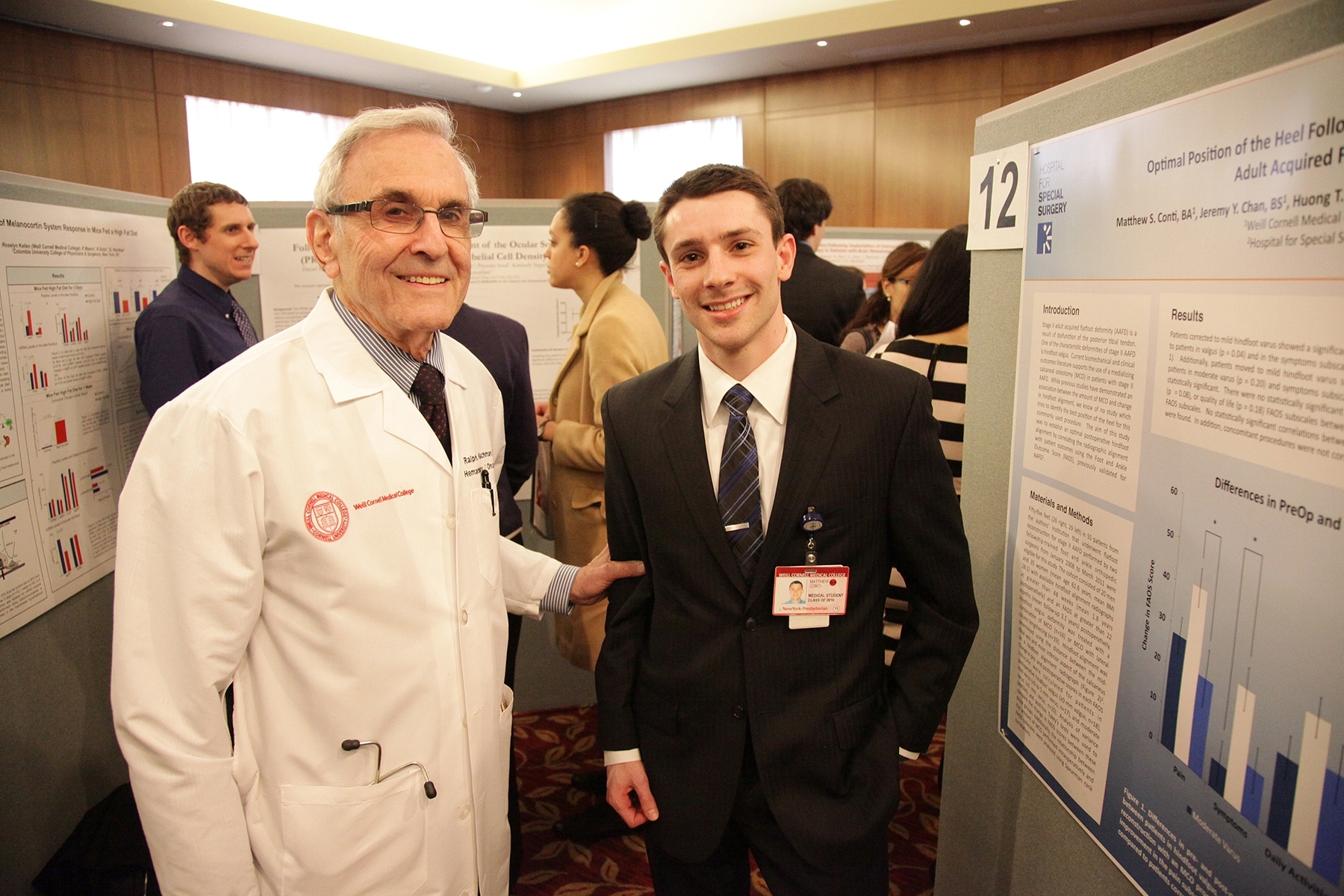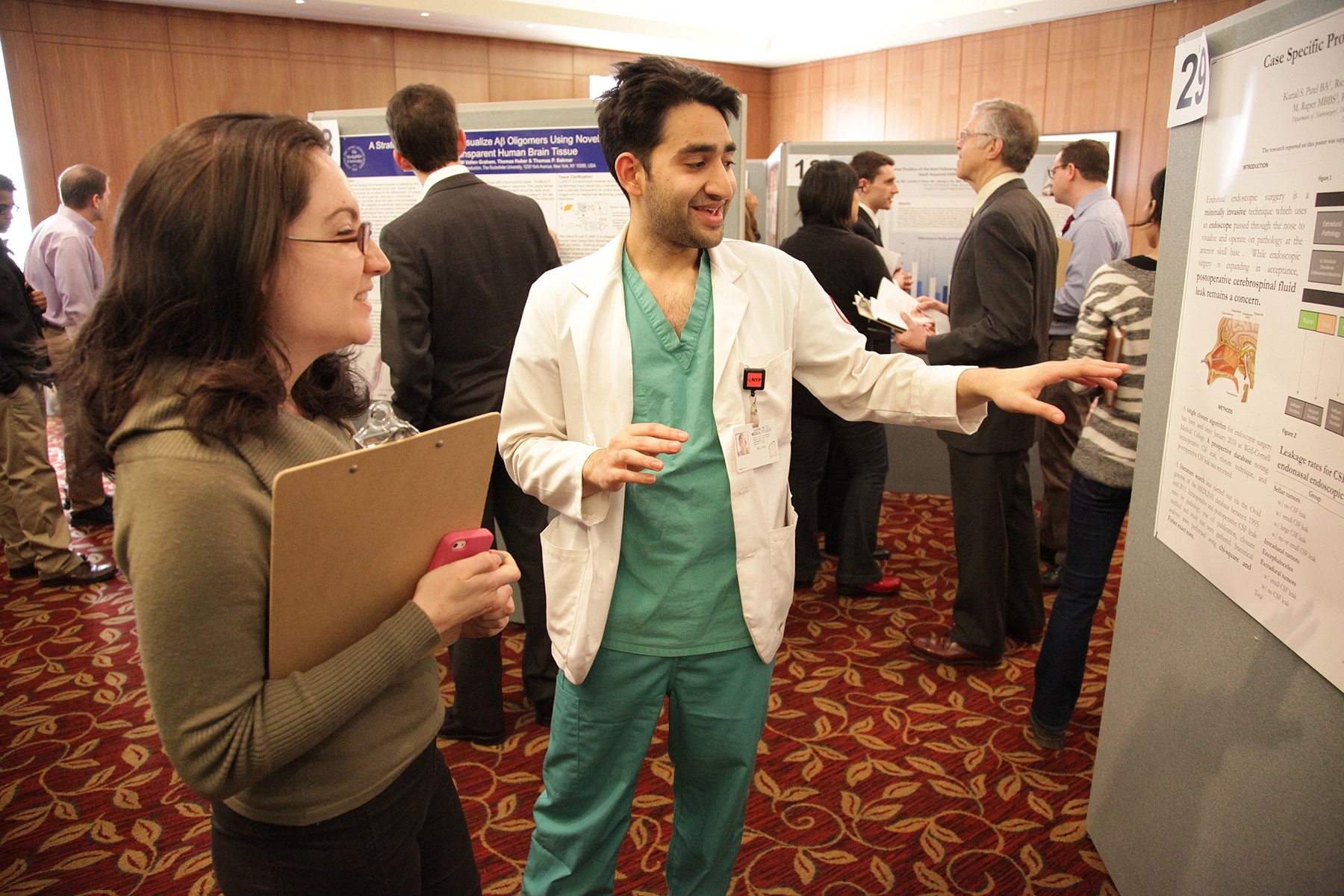
Dr. Ralph Nachman and medical student Matt Conti during Medical Student Research Day
One of the biggest reasons second-year medical student Matt Conti chose Weill Cornell Medical College for his education was its emphasis on student scholarship and scientific research.
It didn't take long for the med student from Pennsylvania to dive right in, spending last summer at Hospital for Special Surgery researching a technique to correct flat feet deformities that can be tailored for each individual patient. The fruits of his clinical research were on full display last month as Conti, 25, shared his findings during Weill Cornell's annual Medical Student Research Day.
Nearly 40 students exhibited their extracurricular research — basic science, clinical or health care policy and research investigations that spanned those disciplines — to their peers, faculty and other investigators. The day-long event on March 20 was organized by first-year medical students Elisa McEachern, Claire Ryan, Alec Faggen and Jenifer Pitman. The day featured oral and poster presentations from the student researchers, who dedicated summers, evenings — some even took a year off from school — to conduct their studies.

Sarah Kishinevsky and Kunal Patel
"Everyone puts a lot of work into the areas they are interested in," Conti said. "It's important to be able to share your experience with your classmates. It's a great way to gain exposure to so many disciplines."
That's as much the goal for Medical Student Research Day as it is to get students familiar with the process of presenting their research, said Dr. Brian Lamon, assistant dean for research development, director of medical student research at Weill Cornell and faculty advisor for the event.
"Like anything, practice makes perfect," he said. "Our students will be presenting down the road over and over again, whether it's a distinguished lectureship, or at a conference, or a small case study in grand rounds, or even speaking informally to colleagues. It's critical that students get involved in the process and get feedback early on in their professional medical careers."
It's a skill that's particularly important to officials at Weill Cornell, who are revising the medical school curriculum to place a greater emphasis on student research. The new curriculum, which will begin full roll-out next fall, includes a six- to nine-month period during which students can devote time to a scholarly area of concentration. The goal is to allow students to individualize their education based on their own interests, and enter residency with advanced expertise.
Second-year student Linda Wu spent last summer doing research that combines her interests in neurology and oncology. Working with Dr. Praveen Raju, the Caryl and Israel A. Englander Clinical Scholar and assistant professor of pediatrics and pediatrics in neurology, Wu investigated how an experimental drug blocks the growth of a deadly brain tumor commonly found in children. Using cell cultures developed in petri dishes, Wu discovered that the drug induces cell death, inhibiting medulloblastoma tumor cell growth. She shared those findings in oral and poster presentations.
"Being able to present my research here is great practice for the real world and for my career," said Wu, 23. "And it's a really great opportunity to explore different career options."
Conti was always interested in orthopedics, but he wasn't sure if the field was for him. He spent the summer working with Dr. Jonathan Deland, a professor of clinical orthopedic surgery at Weill Cornell, to see if an interest could become a career. With his mentor, Conti studied a common surgical technique that cuts the foot's heel in half and repositions one half to create an arch, thereby correcting flat-footedness. But where surgeons place the repositioned heel is the same for all patients, despite the individual anatomy of each patient's foot. Conti's research focused on determining where a given patient's heel should move so that the procedure is individually tailored.
The experience planted in Conti the seed for orthopedics. But he's keeping an open mind about future career fields.
"I'm only a second-year medical student," he said. "I still have plenty of time to decide."

